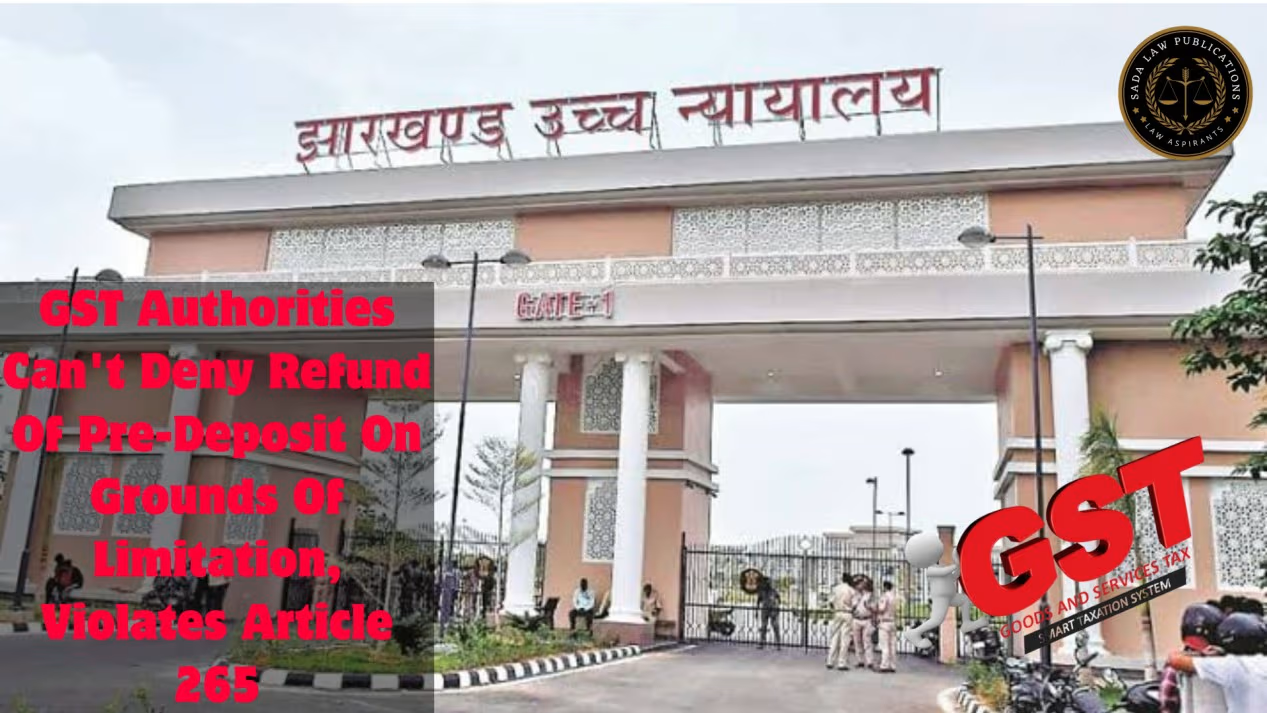Trending Today
Jharkhand High Court: GST Refund of Pre-Deposit Can’t Be Denied Due to Limitation, Cites Violation of Article 265
- NITU KUMARI
- 11 May 2025

The Jharkhand High Court rules that GST authorities cannot deny a refund of statutory pre-deposit on limitation grounds. Learn how this landmark judgment protects taxpayer rights under Article 265 of the Constitution of India.
GST Pre-Deposit Refund Cannot Be Denied on Limitation Grounds, Says Jharkhand High Court
Introduction: A Major Win for GST Assessees
In a landmark ruling, the Jharkhand High Court has clarified that GST authorities cannot reject refund claims of statutory pre-deposits merely due to the expiry of the limitation period under Section 54(1) of the CGST Act. This judgment reinforces the constitutional protection provided under Article 265 and affirms that such refunds are a statutory right of the assessee.
Case Overview: BLA Infrastructure Pvt. Ltd. vs State of Jharkhand
Case Title: M/s BLA Infrastructure Pvt. Ltd. vs State of Jharkhand
Date of Judgment: 18 April 2025
Bench: Chief Justice M.S. Ramachandra Rao and Justice Deepak Roshan
The petitioner, a registered dealer under the Goods and Services Tax Act, is engaged in the loading and transportation of coal. A Show Cause Notice under Section 74 of the JGST Act, 2017 was issued in January 2021 for a mismatch between GSTR-1 and GSTR-3B filings for September 2019. This resulted in an ex-parte order imposing a liability of ₹16,90,442, including tax, interest, and penalties.
To file an appeal, the petitioner deposited 10% of the disputed tax as a statutory pre-deposit under Section 107(6)(b). After winning the appeal, they applied for a refund of the pre-deposit, but the application was rejected as time-barred under Section 54(1).
Court’s Observations: Refund Is a Statutory Right
The Division Bench emphasized that refund of a pre-deposit is a statutory exercise and cannot be denied using limitation clauses. The Court noted:
“There is no dispute that once refund is by way of statutory exercise, the same cannot be retained by the State or Centre by taking aid of a provision which is directory in nature.”
The Court highlighted that the use of the word “may” in Section 54 indicates discretion, not a mandatory requirement, and that denying refund based on limitation would be arbitrary and contrary to the Limitation Act, 1963.
Rejection Quashed: Refund Must Be Processed
The Deficiency Memo dated 06.11.2024, which rejected the refund application, was declared legally unsustainable. The Court ordered the GST Department to process the refund within six weeks, along with any applicable statutory interest.
Key Takeaways for Taxpayers
1. Pre-deposit refunds are a statutory right
2. Limitation under Section 54(1) does not apply to such refunds
3. Authorities cannot interpret directory provisions as mandatory
4. Article 265 protects taxpayers from arbitrary retention of funds
Conclusion: Upholding Assessee Rights in GST
This judgment is a significant precedent for all GST assessees seeking refunds of statutory pre-deposits. It clarifies that such refunds are not subject to the usual GST refund time limits, reinforcing legal clarity and taxpayer protection under Indian tax law.
Case Laws






